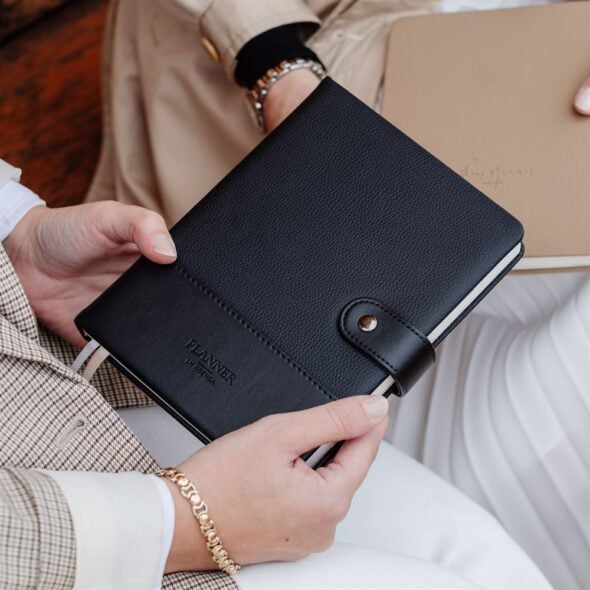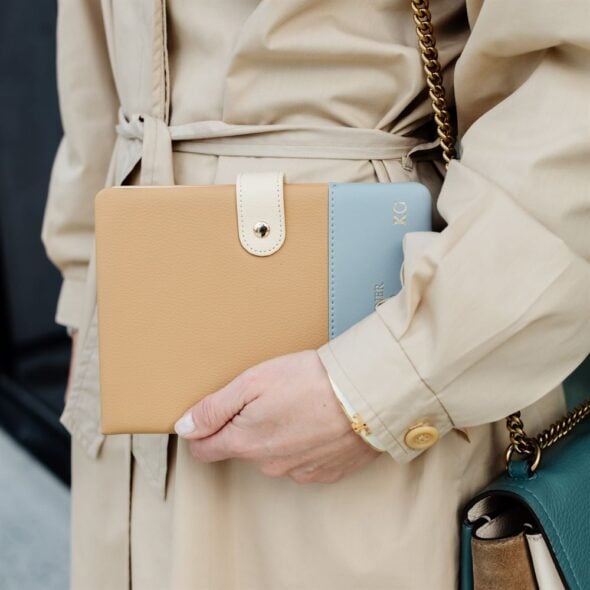
Heading to a wine tasting and don’t quite know what you’re doing?
Don’t worry, winemaker Julie Montgomery – who is behind Avon Brae wines, and whose Avon Brae Eden Valley Chardonnay 2016 was named White Wine of the Year last year by Cellarmasters – shares her top tips for how you can taste like an expert and get the most of your winetasting experience.
Did you know our award-winning planners and journals are designed in collaboration with industry experts? They feature mindset, productivity and leadership content to inspire and empower you.
Don’t drink coffee or smoke before a tasting
To properly appreciate a wine, your palate should be as ‘clear’ as possible. So don’t drink coffee, smoke or brush your teeth at least two hours before a wine tasting. If you need to cleanse your palate, have a piece of bread or a cracker.
Avoid wearing lipstick and perfume
We all love a nice lippy, but did you know that the oils in lipstick and lip balm can really impact the taste of the wine? Also, avoid wearing perfume and hairspray to a tasting, as the strong scents can interfere when you try to smell the wine. 80 percent of what you taste in wine is what you smell (this is why when you have a blocked nose, you can barely taste any flavours), so this is indeed a very important rule to remember.
Shortlist your favourites
Find out what wines will be served at the tasting, and shortlist the ones you want to try. Take into consideration the wine varieties you tend to like, but also use this as an opportunity to try something different. For casual tasting, stick to no more than say 20 wines to sample in one day, as your palette can get fatigued.
Try the whites first & use sparkling as a palette cleanser
Try the white wines first, as this will keep your palette clean. Once you start tasting the reds, don’t go back to the whites. However, if you do end up tasting a mix of red and white varietals, use sparkling wine as a palette cleanser or a bit of bread and cheese.
Look, smell, swirl and smell again
Once you have the wine in your glass, look at it. Notice the colour, clarity and viscosity as these things tell you a number of things about the wine you are about to smell and taste. Smell it – don’t swirl it around immediately, as doing so opens all the aromas and can hide the different characters.
After your first smell, swirl the wine in the glass and smell again. As mentioned above, smell is important when it comes to wine, as you are preparing your brain for the wine you are about to taste. Our sense of smell has a profound effect on the way our brain processes flavour. When smelling a wine, try to associate the aromas with things you are reminded of, such as fruits, flowers, herbs and spices.
Want to live a life that makes you excited? Our LH Planners use our Dream | Define | Do framework, based on proven mindset and productivity research, so we know it will help you achieve what you put your mind to!
Tasting
Taste the wine by swirling it around in your mouth for five to ten seconds. This will warm up the wine and cover your taste buds. If you can aerate the wine by sucking a small amount of air as you take it into your mouth, this will allow more flavor intensity for the full experience,
Take note of the finish
After you’ve tasted the wine, take a moment to notice the finish. How long does the flavour last, what is the lasting taste? Does it appeal to you?
Ask the winemaker
At many festivals and wine-tasting events the winemaker will be there, so take the chance to ask them questions about their wine. For instance, what temperature the wine is best served, what food goes best with it, if you should cellar it and if so, for how long and what will happen to the flavour if you do so.
Tasting should be fun
Remember that tasting wine is one of life’s pleasures and it should be fun. Tasting is subjective and each taster is different. Don’t overthink the process, otherwise you may forget to enjoy the experience.
Mini vino vocab
The top five words to know ahead of a winetasting.
Acid = Acidity gives wine its tart and sour taste.
Mouthfeel = This is used to describe the body and texture of the wine, for example: silky, smooth, velvety and rough.
Balance = A wine is balanced when all the different components are working in harmony. The key components that should be in balance are alcohol, acidity, tannin, sweetness and fruit.
Finish = The lasting impression of a wine and the taste that stays on the palate after it has been swallowed. The length of the finish is the final indicator of the wine’s quality.
Dryness – A dry wine is simply a wine that has no residual sugar, meaning it isn’t sweet
You can meet Julie and eleven other Australian female winemakers (and taste their wines, of course) on International Women’s Day this year!
To celebrate Australia’s female winemakers, Cellarmasters is hosting Meet the Makers: Women in Wine on International Women’s Day on March 8. The event is an opportunity for wine lovers to meet some of the country’s best female winemakers and taste their wines.
Where: View By Sydney, Pier 2, 13 Hickson Rd, Walsh Bay
Date: Thursday March 8
Time: 6:00pm – 8:30pm
Tickets: $39 * (includes a glass of sparkling on arrival, cheese and canapes, and tastings of over 40 different wines. *Plus booking fee.)



